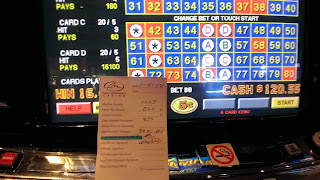How Crazy Are Crazy Gamblers?
 |
| Photo of modern gambler |
Although there has been no substantial research done with problem gamblers who are psychotic, it is probably an area of neglect, rather than a reflection of a lack of association. The counselor is likely to run into clients with a history of psychotic problems, but despite being stabilized with some form of treatment, they are easily drawn to gambling. Specific counselling on gambling is an
important part of treatment for these clients. In general, they would fall into pathways 2 and 3.
Actively psychotic clients may gamble for the same reasons that a depressed or anxious client does; however, it is much more worrying, since the normal sense of checks and balances is even more diminished in the impaired reality testing of the psychotic client. The judgment of those in treatment may still be impaired. As well, these clients are often without meaningful engagement and social networks, and therefore very vulnerable to the attractions of gambling.
Definition and Treatment Issues
A strict definition of psychosis is a state in which one has lost touch with reality. Some psychotic clients have some insight and know that they are having unusual and bizarre experiences. The common types of this disorder include schizophrenia and delusional disorder (e.g., non-bizarre delusions of persecution, jealousy, etc.). A psychotic client commonly has a major disturbance in reality testing, perceptual disturbances (e.g., auditory or visual hallucinations), thought form disturbances (e.g., illogical, disorganized thinking), and bizarre and significantly abnormal behaviour (e.g., severe neglect of hygiene, unusual utterances, etc.). Psychotic disorders are chronic conditions that usually start in the late teens to early 30's (e.g., schizophrenia), or 40's to 50's (e.g., late-onset schizophrenia, delusional disorder). They are some of the most debilitating forms of mental illnesses and affect about 1–2% of the population.
Screening for Psychotic Disorders
Clinical knowledge is the primary tool. Use the dsm for general guidance.
When to Refer for a Psychiatric Assessment
Many psychotic clients may have had previous treatment or some current follow-up available. The issue is therefore more about communicating with their other treatment professionals about their gambling problems, and working collaboratively. For those clients who aren’t currently in treatment, or those with a first episode of psychosis, prompt referral or taking them to the emergency room of a local hospital would be indicated.
A critical component of a comprehensive treatment approach to psychoses involves referring clients to psychiatric services to help control intrusive psychotic symptoms. Though there is a significant stigma attached to treating the psychotically ill, stemming from the age of institutionalization, the field of psychiatry has changed significantly since then, and newer medications (e.g., Risperidone®, Olanzapine®, etc.) have fewer side-effects and are well tolerated by most clients.
Issues to Consider while Counselling
Increased availability of gambling venues and ease of access, such as bingo, lottery ticket, video gambling, etc., pose a particular risk to the psychotic patient — closely monitoring clients’ daily activities, exploring alternative hobbies and developing stable relationships are key issues in long-term treatment of psychotic clients.
Encourage clients to participate in some form of psychiatric outpatient programs — compliance in treatment is a major predictor of outcome.
Co-ordinate family and client education regarding gambling — clients are often socially isolated. Not only do their limited social contacts have an enormous influence on their behaviour, but their families also may encourage gambling, thinking it to be less risky behaviour.
Consider applying for financial guardianship if the client is clearly unable to manage money despite treatment efforts.
Monitor safety — psychotic clients are more prone to suicide, particularly given that they are easily overwhelmed and lack general coping skills.
Case study: schizophrenia
Mr. B is a 36-year-old Asian immigrant with schizophrenia that was diagnosed in his late teens. He has never been employed and relies on social assistance. He lives alone and regularly attends an outpatient clinic where he receives regular medications for his psychotic disorder. In addition, he partakes in ongoing social skills training and counselling. His gambling problem has been a long-standing issue but no counsellor inquired into it until recently. At baseline, despite medications, Mr. b has some psychotic symptoms such as auditory hallucinations, mild paranoia, odd beliefs and significant disorganized, bizarre behaviour (e.g., poor hygiene, talking to the sky, etc.).
He started going to horse races in his teens, initially with his family as a form of recreation. He had won some money, but never a large amount, and he enjoyed the time spent with his family. As his illness broke, he began to attend races more often, alone, wagering larger sums with an ostensibly illogical betting pattern. He acted in response to his “voices,”which told him to bet on horses with “buzz” sounding names. He would laugh openly at those who bet differently, and later scream at his own “voices” when the “buzz”-sounding horses failed to show. As his mental illness worsened, he became more isolated and gradually lost contact with his family. His gambling became worse — on several occasions, he lost his rent money and ended up in shelters or hospital. He resorted to some stealing, and running away from restaurants without paying so he could save up money to gamble. It took some time before the treatment team learned of his gambling problem.
Applying the Pathways Model
This client fits in pathway 2, but due to his psychiatric illness, he also has impulsive issues as a pathway 3 client. His treatment included close monitoring, behaviour substitution, and close collaborative work with his other therapists.
by Samuel Law




Comments
Post a Comment